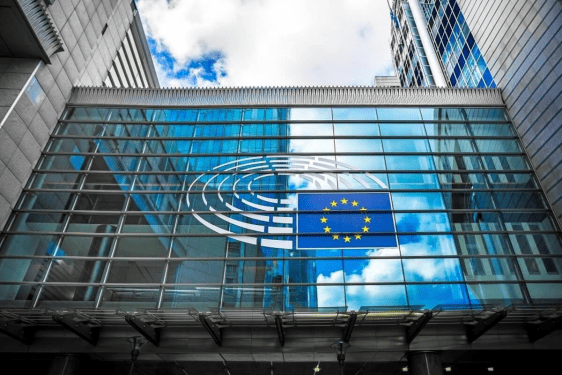01 Jul, 2022
'More Work to Be Done' as EU Imposes Strict New Crypto Regulations

After the EU has reached an agreement on cryptoasset regulation that sets out strict rules for all actors in the crypto market, the crypto industry reminds itself that there's still "more work to be done."
Rebecca Rettig, the general counsel for decentralized finance (DeFi) platform Aave (AAVE) and a board director at the crypto-friendly Silvergate Bank, applauded the effort to “provide clarity in the crypto space,” which she said they have been “requesting for years. But more work to be done.”
She went on to say that given how DeFi will be on the EU’s radar next, the DeFi sector now needs to make sure policymakers understand the technology and the fact that DeFi “must be regulated differently” than centralized crypto actors.
“As the EU delves into DeFi we will collaborate with policymakers to ensure there is a safe & robust system for users while making space for continued innovation in the Web3 world,” Rettig added.
Meanwhile, the new rules constitute a provisional agreement on the long-awaited Markets in Crypto-assets (MiCA) regulatory framework, and hold so-called cryptoasset service providers (CASPs) liable to a much higher degree than before.
Commenting on the agreement, Bruno Le Maire, French Minister for the Economy, Finance and Industrial and Digital Sovereignty, said that the new regulation “will put an end to the crypto wild west,” while confirming the EU's role as “a standard-setter for digital topics.”
Among the requirements that will be placed on CASPs under the new rules is legal liability for the companies if they lose their clients’ cryptoassets. The rule covers all centralized companies in the crypto space, including wallet providers of ‘hosted’ or custodial wallets, but not so-called ‘unhosted wallets’, or just regular, private wallets, controlled by their users.
In addition to rules on wallets, the new regulations also impose new requirements designed to prevent “market manipulation and insider dealing,” the announcement said.
Further, the rules went into detail on the “environmental and climate footprint” of various actors in the cryptoasset market. These actors will in the future be required to declare information related to their environmental impact, in line with technical standards that will be developed by the European Securities and Markets Authority (ESMA).
The announcement added that the European Commission within two years will publish a report on the environmental impact of cryptoassets, as well as introduce “mandatory minimum sustainability standards” for consensus mechanisms such as proof-of-work (PoW).
Moreover, the newly reached agreement says that the European Banking Authority (EBA) will be tasked with keeping an up-to-date list of all service providers who do not comply with the EU’s rules.
For service providers whose parent company is located in the countries that the EU considers at high risk for money laundering, or in the countries on the EU’s list of “non-cooperative jurisdictions for tax purposes,” additional measures will be taken. This includes “enhanced checks” in line with the EU’s anti-money laundering framework.
Compliant stablecoins
For stablecoins, the new regulations state that only fully backed stablecoins will be compliant, and that holders must be able to redeem the coin at a 1:1 ratio “at any time and free of charge by the issuer.”
It added that all stablecoins will fall under the supervision of the European Banking Authority.
A physical presence of the stablecoin issuer in the EU will be a “precondition for any issuance.”
Meanwhile, commenting ahead of Thursday’s announcement, Philipp Pieper, the co-founder of the DeFi infrastructure provider Swarm said in an emailed comment to Cryptonews.com ahead of the decision that the new rules are expected to hit stablecoins particularly hard.
Stablecoins are “in the firing line,” Pieper said, correctly predicting that there would be “some fairly heavy-duty new rules coming in relating to registration and issuance.”
Excluded NFTs
The announcement said that non-fungible tokens (NFTs) are “excluded from the scope except if they fall under existing crypto-asset categories.”
It added that further regulations covering the NFT market will be proposed by the European Commission “if deemed necessary.”
Subject to approval
The new rules are still subject to the approval of the European Council and European Parliament before going into force.
They come in addition to the Transfer of Funds Regulation (TFR) that was agreed on earlier this week, which covered the traceability of crypto transfers and rules relating to the so-called ‘unhosted wallets’.
https://cryptonews.com/

We accept all popular crypto
Tether (USDT), Bitcoin (BTC), Ethereum (ETH), Litecoin (LTC), TRON (TRX), Binance coins (BNB, Binance USD (BUSD)), USD Coin (USDC)








